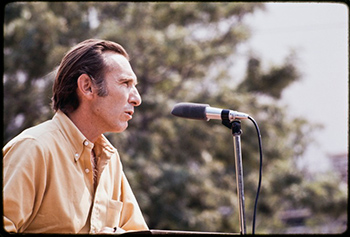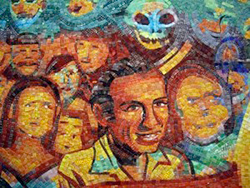
Published Date
Share This:
Carlos Blanco Aguinaga, One of Founders of UC San Diego Literature Department, Dies

Carlos Blanco Aguinaga at the Thurgood Marshall College opening ceremony on September 26, 1970.
Carlos Blanco Aguinaga, distinguished literary critic, fiction writer, and one of the founders of UCSD’s Literature Department, died in La Jolla on September 11, 2013.
Born in Irún, in the Basque country, Blanco was 9 years old when he and his anti-Francoist family became exiles during the struggle between Republican loyalists and Falangist military forces (Spanish Civil War, 1936-39). The family’s journey began in France and eventually led them to Mexico City in 1938. Blanco went on to receive his B.A. from Harvard and his Ph.D. from the Colegio de México with a dissertation on the Spanish writer Miguel de Unamuno. Together with Carlos Fuentes, Octavio Paz and others, Blanco was a cofounder of Revista Mexicana de Literatura, an internationally preeminent journal of Latin American letters. Prior to coming to UCSD he held positions at the Colegio de México, Johns Hopkins, and Ohio State University.
In 1964, he was recruited as a founding member of UCSD’s Department of Literature. In the early decades of the La Jolla campus, he was – to remember just a few of his contributions – faculty advisor for the Mexican American Youth Association (MAYA; later known as MEChA); collaborator with Angela Davis and others in the proposal to create the Lumumba-Zapata College (later Third, now Marshall College); founder of Third World Studies; defender of exiled Chilean intellectuals after the military coup of 1973; and always a strong advocate for Chicano and Latin American studies. At the height of campus activism in the later 1960s, former Chancellor William McGill referred to Blanco as “one of our most formidable campus radicals.” Blanco’s influence on many Chicano/a students is evidenced by his inclusion in the UC San Diego “Chicano Legacy 40 Años” mural, a mosaic celebrating the Chicano Movement that was inspired by figures as Dolores Huerta and Cesar Chavez.
In the 1980s, he also taught in the Facultad de Letras of the University of the Basque Country (Euskal Herriko Unibertsitatea) in Vitoria-Gasteiz, Spain. He became Professor Emeritus in 1994.

“Chicano Legacy 40 Años” mural at UC San Diego - detail picturing Carlos Blanco Aguinaga.
His experience of exile, political commitment, literary sensibility, theoretical acumen, and generosity as a colleague and mentor contributed to make Carlos Blanco Aguinaga an especially influential intellectual, scholar of Spanish and Latin America literature and creative writer. Author of many books of literary scholarship, he was especially renowned for his work on Galdós – La historia y el texto literario: Tres novelas de Galdós (1978); Unamuno – Unamuno contemplativo (1959 and 1975); writers of the “Generation of ’98” – Juventud del 98 (1970, 1978, and 2000); a Marxist interpretation of Spanish literature (in collaboration with Iris Zavala y Julio Rodríguez Puértolas) – Historia social de la literatura española (1978-79); cultural production of the exiled Spanish community – Ensayos sobre la literature del exilio español (2006) and Emilio Prados: vida y obra – bibliografia – antologia (1960); and an influential study of Mexican writer Juan Rulfo. His novels, short stories, and memoirs – also exceptional testimony of his extraordinary and engaged life across multiple political cultures – include: Un tempo tuyo (1988; trans. A Time of Your Own, 1997); Carretera de Cuernavaca (1990); En voz contínua (1997); Ya no bailan los pescadores de Pismo Beach (1998); Por el mundo: infancia, guerra y principio de un exilio afortunado (2007); and De mal asiento (2010).
Carlos Blanco Aguinaga is survived by his wife, Iris Blanco Arévalo, his daughters Alda and Maria Blanco, his son Renato Barahona, and two grandchildren: Amaya Blanco Ramírez and Ernesto Barahona Mallen. Blanco was preceded in death by a third grandchild, Isabel Blanco Ramírez. He also lives on in the hundreds of students and colleagues who had the privilege to learn from him.
If you are interested in learning of plans to honor the contributions and memory of Carlos Blanco, please contact Professor Jorge Mariscal of the Department of Literature.
Share This:
You May Also Like
Stay in the Know
Keep up with all the latest from UC San Diego. Subscribe to the newsletter today.


